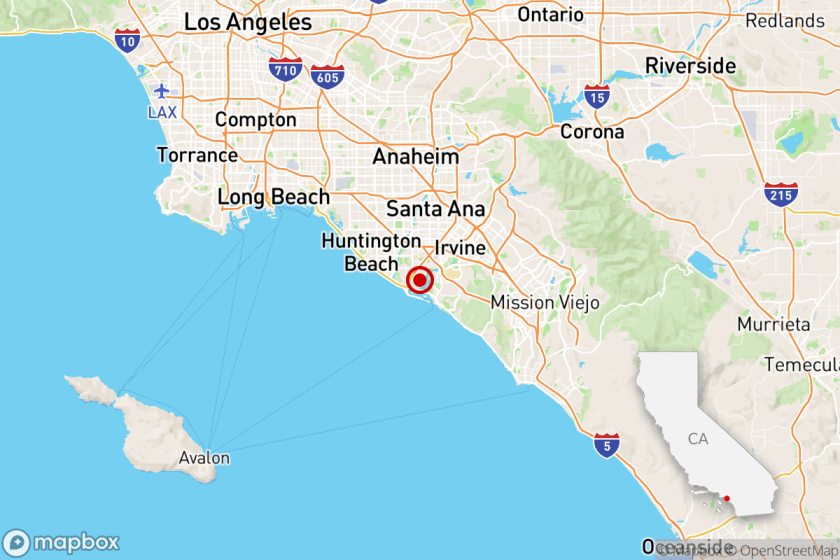Fifth quake to hit SoCal in 5 days: Small temblor strikes Newport Beach

A magnitude 2.6 earthquake struck Newport Beach on Wednesday afternoon, resulting in weak shaking in Orange County.
The epicenter of the quake, just southeast of Costa Mesa, was underneath Mariners Park. Weak shaking was felt in Irvine, Santa Ana, Huntington Beach, Garden Grove, Tustin and Fountain Valley, according to people who reported the shaking to the U.S. Geological Survey's Did You Feel It? website.
The earthquake struck at 1:46 p.m. and occurred near mapped traces of the Newport-Inglewood/Rose Canyon fault zone. In Santa Ana, one person said they felt the earthquake as starting with the slowest of rumbles, then a quick jolt.
The Newport-Inglewood fault has long been considered one of Southern California’s top seismic danger zones because it runs under some of the region’s most densely populated areas, from the Westside of Los Angeles to the Orange County coast.
Read more: Notorious L.A. earthquake fault more dangerous than experts believed, new research shows
The last major quake on that fault occurred in 1933 — the magnitude 6.4 Long Beach earthquake. That temblor — the deadliest in modern Southern California history — resulted in "very strong" shaking, or level 7 on the Modified Mercalli Intensity Scale, in Long Beach, Huntington Beach and Compton.
The 1933 quake left nearly 120 dead and caused $40 million in property damage.
Scientists have said that recent observations suggest earthquakes as large as magnitudes 6.8 to 7.5 have struck the Newport-Inglewood/Rose Canyon fault system, which stretches from the border of Beverly Hills and Los Angeles through Long Beach and the Orange County coast to downtown San Diego.
Research published in 2017 suggested the Newport-Inglewood fault is more active than previously thought. If a magnitude 7.5 earthquake did rupture along that fault system, such a temblor would bring massive damage throughout Southern California. An earthquake of magnitude 7 would hit areas of Los Angeles west of downtown particularly hard.
The 2017 study uncovered evidence that major earthquakes on the fault centuries ago were so violent they caused a section of Seal Beach near the Orange County coast to fall 1½ to 3 feet in a matter of seconds.
Read more: Faster alerts for California megaquakes: Early-warning system gets major upgrade
Wednesday's earthquake was the fifth of magnitude 2.0 and above that has struck the Southern California metro area in the last five days.
Earlier Wednesday, a magnitude 2.2 earthquake struck underneath the San Gabriel Mountains, less than two miles from the northern edge of Rancho Cucamonga in San Bernardino County. That earthquake, which was down from an earlier estimate of 2.5, struck at 5:01 a.m.
A pair of earthquakes hit the eastern Los Angeles neighborhood of El Sereno on Sunday and Tuesday. The first was a magnitude 3.4, striking at 9:56 a.m. Sunday, a couple blocks south of Huntington Drive and Eastern Avenue. The second was a magnitude 2.8, down from an earlier estimate of magnitude 3, and hit at 3:05 p.m. Tuesday. Its initial estimated epicenter was revised from beneath the Elephant Hill Open Space to farther south, about 700 feet northwest of Sunday's quake.
Read more: The Hollywood fault is an invisible earthquake danger running under the heart of L.A.
On Friday, at 10:26 a.m., a magnitude 3.6 earthquake — down from an original estimate of 3.8 — occurred with an epicenter just north of the Ojai Valley, causing weak shaking to be felt from Santa Barbara to Los Angeles.
It's not uncommon for Southern California to see small earthquakes. Most do not lead to larger, catastrophic quakes. And although some larger earthquakes are preceded by smaller quakes, that is not always the case.
It's simply impossible to know whether small earthquakes are "foreshocks" to a larger quake before the more powerful event strikes.
Times staff writer Gustavo Arellano contributed to this report.
This story originally appeared in Los Angeles Times.

 Yahoo News
Yahoo News 
